


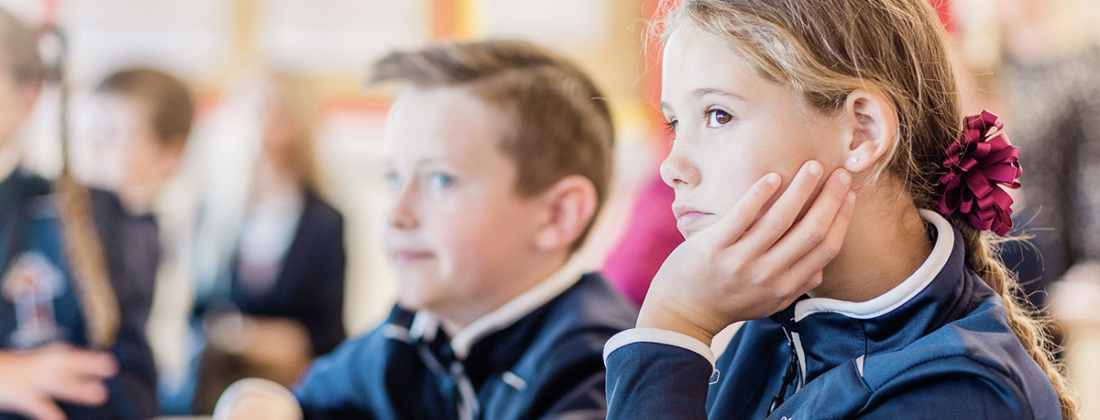

Attendance and Punctuality

LAUNCHING IN SEPTEMBER 2024
Roby Park Primary School is proudly recognised as an Inclusive Attendance school. Our unwavering commitment to attendance centres around child-centric actions, evidence-informed practices, and a shared understanding of everyone’s roles and collective responsibilities to promote exceptional attendance.
Multi-Tiered System of Support
To guarantee a comprehensive approach to attendance, we implement a Multi-Tiered System of Support. A Multi-Tiered System of Support (MTSS) for school attendance involves three tiers of intervention, with roles for teachers, the school, children, parents, and external agencies – including the Local Authority. Data-driven decision-making and training requirements are pivotal to the implementation of the system. The system aligns with the Department for Education’s (DFE) “Working Together to Improve School Attendance” guidelines.
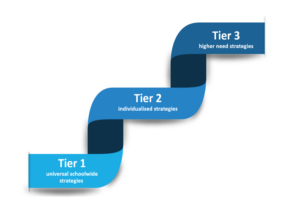
Tier 1 – Universal Approach: A universal attendance approach that benefits all children.
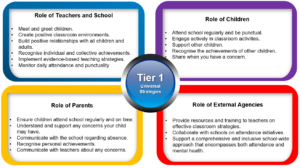
Tier 2 – Individualised Strategies and Early Help Support: Tailoring strategies to individual needs and providing early help support for persistent attendance challenges.
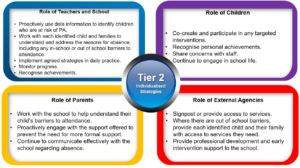
Tier 3 – Higher Needs Strategies Support: Specialised support for children, young people, and families with complex attendance requirements, including access to external agency support when necessary.
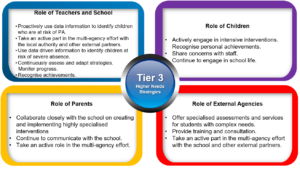
Recognition Based Approach
Our attendance philosophy is rooted in a recognition-based approach that recognises both personal and collective achievements. This approach serves to cultivate positive environments, nurture relationships, foster inclusivity, and ultimately cultivate intrinsic motivation among our children, families, and staff.
The Importance of School Attendance
School attendance is not merely a requirement but a fundamental part of education. It plays an important role in shaping academic success, personal growth, and future prospects, making it an essential aspect of any educational system.
- Relationships: School provides a vital social environment for children to interact with peers, develop friendships, and learn essential social skills. Consistent attendance ensures children remain connected to their peer group.
- Teacher Interaction: Regular attendance allows for meaningful teacher-child interactions. Teachers can provide personalised support, address questions, and assess individual progress more effectively when children attend regularly.
- Wellbeing: High levels of school attendance contribute to the overall wellbeing.
- School Engagement: Children who attend school regularly are more likely to engage in extracurricular activities, sports, and other enriching experiences that contribute to their overall development.
- Academic Achievement: Regular attendance directly correlates with academic success. Children who attend school consistently are more likely to keep up with the curriculum, perform better in exams, and improve their life outcomes.
- Sticky Knowledge: School is where children acquire knowledge and skills that are crucial for their personal and professional growth. Missing days means missing out on valuable learning opportunities.
- Preventing Knowledge Gaps: Frequent absences can lead to significant knowledge gaps, making it challenging for children to catch up with missed lessons, potentially resulting in long-term academic struggles.
- Building Routine: School attendance establishes a structured routine in children’s lives, teaching them time management and responsibility, which are valuable life skills.
- Legal and Parental Responsibility: Parents or guardians are legally responsible for ensuring their child’s regular school attendance. Failing to do so can lead to legal consequences.
Relevant Documents:
- 4.9.24 Inclusive Attendance
- School Attendance Policy
- Bullet Point Attendance Policy for Parents
- Education Penalty Notice Code of Conduct
- Knowsley School Attendance Service EPN Leaflet
- Knowsley Attendance Strategy 2021-2024
Attendance and Punctuality Chatter


Attendance Recognition Winners
This week’s attendance recognition winners were Y3 & Y5. Miss Sutton’s Y3 attendance recognition nomination was: “ Well done to the class for being fabulous this week starting our new history learning on the Stone, Bronze and Iron Age! Everyone, especially Alfie, were so curious to learn more!” Whilst Mr Stansfield said about Y5: “ Well done to Nieve for using your sensory breaks correctly to enable you to work to the best of your ability.” Nieve popped on the top hat and rolled the dice, winning her classmates a non-uniform day. Well done Nieve!
13
Y4 Attendance Recognition
Year 4 landed on popcorn and a movie on our Classopoly board #RPAttendance #RPEnrichment
10
Y5 Attendance Recognition Reward
We enjoyed our attendance recognition prize of parachute games this week!
12



